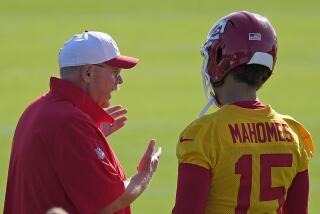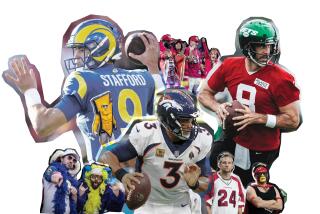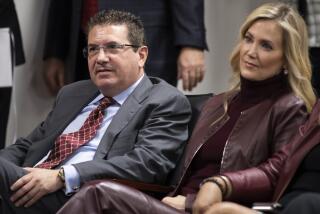NFL STRIKE : ‘Mystery Man’ Gets Them Talking : Rozelle Steps Into the Picture; Formal Meeting Set Today
- Share via
Pete Rozelle, National Football League commissioner, was identified by several sources Tuesday as the “mystery man” whom union leader Gene Upshaw hoped could resolve the day-old player strike.
And there were strong indications Tuesday night that Rozelle had worked some magic, that his influence had helped bring about a scheduled negotiation start Wednesday, the first meaningful negotiations to date. The negotiations are scheduled to be held in Philadelphia.
“We plan to meet around the clock,” Upshaw said after arriving at NFLPA headquarters in Washington. “We have a format set up where we have the owners in one room, the players in one room, Jack (Donlan) and I in the middle and we’re going to try to hammer this thing out.”
John Jones, a spokesman for the NFL Management Council, said the owners’ regular bargaining team would be joined by two members of the council’s executive committee -- Tex Schramm of the Cowboys and Dan Rooney of the Pittsburgh Steelers. Rooney was instrumental in negotiating the agreement that ended the 57-day strike in 1982.
Upshaw also said Tuesday night that whether or not there would be games this weekend depended on the progress of those talks.
A union spokesman had said earlier that this weekend’s games were “almost definitely off” even if an agreement were reached immediately.
“It would take three days to hammer it out in writing,” the spokesman said, “and we’re not coming back until we have something definite.”
The NFL office has said the schedule will pick up with Week 4, on Oct. 4, with non-union squads, if necessary.
It has been Rozelle’s policy to stay out of the negotiations, leaving that to the NFL’s Management Council, headed by Donlan.
Upshaw, however, had expressed doubt that Donlan has enough authority to bargain meaningfully for the owners, so Monday he went directly to Rozelle.
The union filed unfair labor practice charges with the National Labor Relations Board Tuesday, protesting $1,000 bonus payments to dissident players and guarantees of 1988 roster spots. The charges singled out the New England Patriots for trading Brian Holloway to the Raiders because of union activities.
The Management Council last week filed an unfair labor practice charge against the union for failure to negotiate.
Meanwhile, players started walking picket lines around the league, and the 28 teams were preparing to start practices today or Thursday with non-union free agents they had cut in training camp and others available and willing to cross picket lines.
Some established players, perhaps not willing to join the non-union players but not willing to join the strike, either, were quickly identified. They included quarterbacks Marc Wilson of the Raiders and Gary Hogeboom of the Indianapolis Colts, defensive end Mark Gastineau of the New York Jets, defensive tackle Randy White of the Dallas Cowboys and safety Leonard Smith of the St. Louis Cardinals.
“It was a tough decision because I don’t want there to be problems in the team,” Hogeboom said. “The main factor, financially, was I have some things in my contract that are too important for me to strike.
“If each player in the NFL knew what was specifically in my contract, then they’d know there was no way I could go on strike. I’m not talking about a couple-hundred thousand dollars. I’m talking about a lot of money--one-fourth of my annuity.”
Gastineau said he was in the middle of efforts to come back from a season of injury and it was not the right time to “give up on it.”
“I’m going to do what’s good for my family,” he said. “I’ve got a little girl, 5 years old, and I want her to have a college education. You have to build for the future for the family.”
Running back James Jones, the Detroit Lions’ player representative, said he does not expect any physical confrontations if players cross the union’s picket lines.
“We’re not going to try to prevent guys from coming,” Jones said. “What are we going to do, use force on them? You can’t do that on the picket line for any union. We’re not going to slash a guy’s tires or beat a guy up--although that wouldn’t be a bad idea.”
There was some ill feeling as players removed belongings from their lockers.
Luis Sharpe, St. Louis Cardinal offensive tackle, said, “We had to get our stuff out of here before a scab player would come in and steal it.”
Several New Orleans Saints waved picket signs and yelled “scab” at three injured reserve players who left the team’s training facility after crossing their picket line. First a car occupied by free-agent tackle William Leach and rookie fullback Todd Steele left the parking lot. Later, five-year veteran Steve Korte left through a different parking lot exit and drew more abusive shouts from players.
One player slapped the top of the car occupied by Leach and Steele.
“How’s your spine?” tackle Bill Contz yelled at Korte.
And cornerback Dave Waymer, commenting about Korte, said, “He’s nothing but a scab. He’s always talking about team unity. What kind of unity does this show? He’s a guy always talking about the playoffs and him going to the Pro Bowl. We’re the guys that vote on the Pro Bowlers, and we’ll certainly remember this.”
Korte said: “Basically, I couldn’t afford it financially.”
Boomer Esiason, Cincinnati Bengal quarterback, said: “I’d sure hate to be one of those scabs in our camp next summer.”
Warren Moon, Houston Oiler quarterback and his team’s player rep, said: “I think it will be difficult for us and difficult for them. It will take a lot of guts for them to cross our picket line and practice while we’re out there fighting for our rights.”
As Moon talked, several Oilers marched to music blaring from a black Mercedes-Benz.
Jim Kelly, Buffalo Bill quarterback, who stands to lose $68,750 a game in the walkout, said he would stay out. But as he climbed into the new sports car provided to him by a local dealership, Kelly joked, “Maybe later, I’ll be driving a Volkswagen.”
The New York Giants, meeting in the parking lot of Giants Stadium, circled their cars to keep the media away.
Ken Easley, Seattle player rep, had harsh words for Jim Zorn, former Seahawk quarterback, who has said he will play, if given the opportunity.
“He obviously is either desperate to play in the NFL or desperate for money,” said Easley. “He was adored and was admired by the fans and teammates. Now, he’s turning his back on us. I think it’s ridiculous and really upsetting.”
Zorn played in Green Bay after leaving the Seahawks and was with Winnipeg of the Canadian Football League last season.
A new Seahawk, rookie linebacker Brian Bosworth, is Seattle’s alternate player rep. He said he did not think fans would put up with the NFL’s decision to play games with non-union players.
“That’s a joke,” Bosworth said. “The fans aren’t going to go for that. They’re paying big money to see the superstars play, not sandlot football. The owners are just insulting the fans’ intelligence. They should be totally outraged.”
Tunch Ilkin, Pittsburgh Steeler player rep, indicated that he may have difficulty arranging a picket line because the club plans to practice its non-union players at Johnstown, 70 miles away. There were no volunteers.
Quarterback Mark Malone said, “I’m not going to drive up there. It’s too far.”
Some striking players planned to organize their own practices, as several did during the last strike in 1982.
“We’ll work out and try to stay in shape, because the team that’s going to be on top is the team that has stayed together during this time,” said Gill Byrd, San Diego Charger defensive back.
Patrick Bowlen, Denver Bronco owner, said he wanted his team to remain a team. “I want my guys to stick together,” he said. “They should probably (strike) as a team.”
Darryl Rogers, Detroit coach, said there shouldn’t be a problem getting the new squads ready to play by a week from Sunday.
“We’ve all coached in all-star games in which we’ve only had a week,” Rogers said. “There were always some restrictions on the other side, like you would not stunt. I don’t think they’ll do that this time.”
Tom Landry, Dallas Coach, said: “We were scrimmaging the Raiders after three days in training camp. It would be no problem playing a game in 10 days.”
Sean Payton, backup quarterback of arena football’s Chicago Bruisers, signed with the Bears, and Walter Briggs, a quarterback for the semipro Connecticut Giants, will play for the New York Jets.
Tampa Bay signed 37-year-old quarterback John Reaves, who first played in the NFL with Philadelphia in 1970 and last played organized football with the USFL’s Tampa Bay Bandits in 1985.
Marvin Powell, the Buccaneers’ offensive tackle who is president of the players’ nine-man executive committee, said team owners have misjudged the resolve of union membership.
“They are trying to test us . . . find out exactly where we stand,” Powell said. “And as I maintained before, they’ll see an NFL player monolith.”
Powell shrugged off suggestions that a sizable number of players seem uncommitted to the issues.
“You’ll find some teams like the New York Giants are die-hards for free agency,” he said. “There are some veteran teams like San Francisco that are interested in pension. You take a team like this (Tampa Bay) and it’s interested in things that concern young players.
“According to our survey, 70% of the players in the league are concerned about free agency and we’re going hell-bent for leather to get it--and we are going to get it. We are not going to come back without free agency, you can bet on that. We are not going to come back unless our pension plan is a real pension plan.”
George Young, Giant general manager, called the strike a sad day for football and criticized the players and their union.
“You have people who live in big houses and drive shiny cars and get a lot of adulation and go first class and are treated as well as any industry treats its employees, and they go on strike,” he said. “It’s difficult to understand that.”
More to Read
Go beyond the scoreboard
Get the latest on L.A.'s teams in the daily Sports Report newsletter.
You may occasionally receive promotional content from the Los Angeles Times.










